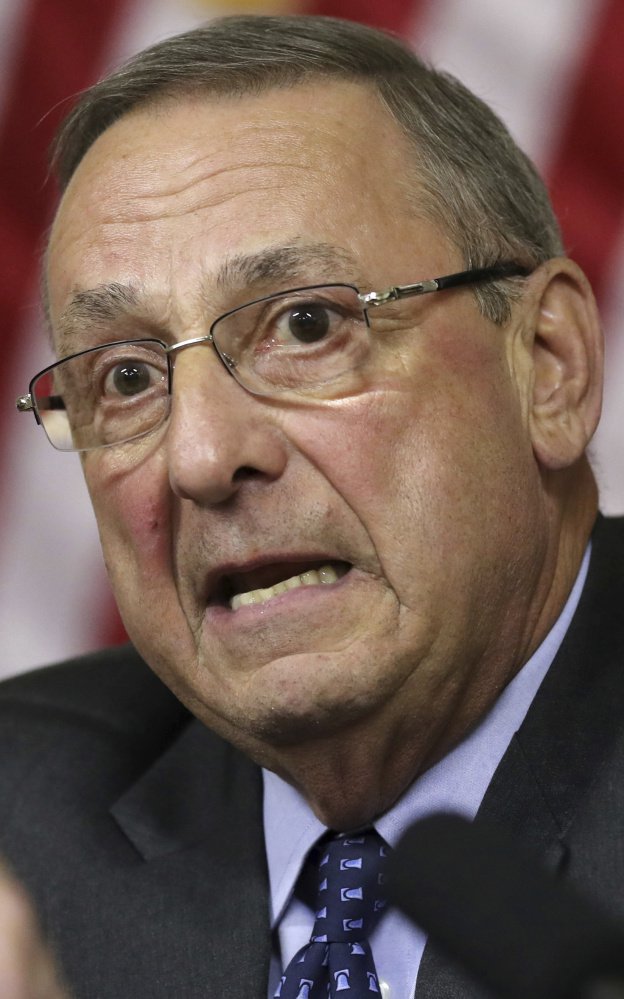AUGUSTA — The Maine Department of Labor abruptly postponed a potential vote Wednesday on a controversial LePage administration proposal to require workforce development agencies to spend a larger portion of the federal dollars they receive on job training.
Gov. Paul LePage wants Maine’s three regional workforce development agencies to devote 60 percent of their federal funding to worker training, in his latest push against a system he says spends too much on administration. But critics contend the 60 percent threshold – which would be the highest in the nation – is unrealistic and could destabilize a system that provides career counseling, job training and business services to tens of thousands of clients annually.
“If you go to 60 percent it doesn’t mean more people would be served,” said Mike Bourret, executive director of Coastal Counties Workforce Inc., the agency that oversees workforce development in southern and coastal Maine. “What it means is we are dropping case managers and locations to get to that 60 percent.”
The three regional agencies that oversee administration of the federal workforce programs devote 10 percent to administration. Exact amounts differ, but the agencies generally split the remaining 90 percent in thirds between worker training, staffing such as case managers and counselors, and spending on leases, utilities, equipment or other infrastructure.
On Wednesday, the Maine State Workforce Board was scheduled to hold an “emergency meeting” to vote on the 60 percent threshold. But some members and leaders of the workforce development agencies objected to the timing of the meeting – the Wednesday morning before Thanksgiving – as well as to plans by the chairman to allow members of the 25-person board of gubernatorial appointees to cast votes by proxy without being present.
Also, staff for the Maine State Workforce Board, the Department of Labor and LePage’s office did not respond to multiple requests Tuesday from the Portland Press Herald for copies of the public meeting’s agenda or the proposed policy changes.
At the same time, Coastal Counties Workforce is suing LePage and his labor commissioner in federal court, alleging they are illegally withholding millions of dollars in federal funds.
“Given the challenges of gathering board members on the day before a holiday and to allow a maximum number of board members to participate, it was determined to cancel the November 22 meeting,” Garret Oswald, staff director of the Maine State Workforce Board, wrote to members Wednesday in an email obtained by the Press Herald. “We apologize for any inconvenience that this ongoing legal challenge has presented. The board will consider the proposed policy at the next regularly scheduled meeting on December 1, 2017.”
ONLY ONE AGENCY NEEDED, LEPAGE SAYS
These are just the latest developments in a years-long dispute over spending and oversight among LePage, federal officials and the regional workforce boards.
LePage has argued for years that Maine only needs one centralized workforce agency to administer the federal dollars aimed at helping unemployed Mainers get the skills they need to find jobs. Yet the Obama administration and, earlier this year, the Trump administration rejected LePage’s request to dismantle the regional system that supporters say caters to the unique needs of Maine’s diverse workforce.
After the Trump administration’s rejection, LePage asked the U.S. Department of Labor not to send any more money to the state and told Labor Secretary Alexander Acosta that “Maine is no longer participating” in the federal workforce program.
“The current system is fraught with redundancies and waste, and I have tried for nearly seven years to reduce overhead and administrative costs so that more funds can go directly to the constituents we are trying to put back to work,” LePage wrote to Acosta. “I will not continue to participate in a system that wastes money.”
Last month, Coastal Counties Workforce – which administers the programs in York, Cumberland, Sagadahoc, Lincoln, Knox and Waldo counties – charged in federal court that LePage was illegally withholding $8.4 million in federal funds. While the administration has since released funds from fiscal year 2016, Coastal Counties Workforce said in its most recent court filing that LePage and Labor Commissioner John Butera “attempted to impose conditions” on the fiscal year 2017 contract in order to receive funds. Those conditions included the 60 percent worker training threshold.
LePage spokeswoman Julie Rabinowitz declined to comment on the 60 percent proposal, saying the issue of releasing federal funds to Coastal Counties and the other agencies “is part of the ongoing litigation.”
“However, the governor’s consistent position since he took office is that the funds going into occupational skills training should be maximized because it directly benefits Maine workers,” Rabinowitz said.
But Joanna Russell, executive director of the Bangor-based Northeastern Workforce Development Board, said requiring that 60 percent of the board’s funding go to training ignores all of the other services needed to help unemployed workers. Someone needs to assess workers’ skills, experience and education to help steer them toward training that they can complete and turn into long-term employment. Other would-be workers, such as individuals whose joblessness is tied to personal issues or people recently released from prison, may need counseling and a case worker to help ensure they stay on track, Russell said.
Also, Maine’s three regional workforce development agencies are obligated under federal law to provide certain services that would inevitably be cut if 60 percent of funding had to go to training.
“It’s not as simple as writing a check to Eastern Maine Community College for training for nursing,” Russell said. “We are required to determine ability, to determine capability to complete these programs, and then we are required to do follow-up with them.”
Kevin Miller can be contacted at 791-6312 or at:
Twitter: KevinMillerPPH
Send questions/comments to the editors.



